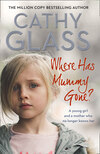Kitabı oku: «Where Has Mummy Gone?», sayfa 4
Chapter Six
The Way Home?
Normally when I collect a child from the Family Centre at the end of contact I sign the Visitors’ Book and go through to whichever room they are in, while the parent(s) make the most of their last few minutes with their child. But now as I stepped into reception I saw that Amanda and Melody were already there, together with the manager and another woman I took to be the contact supervisor. For a moment I assumed they’d just finished contact punctually, but then I saw their expressions and knew something was wrong.
‘That’s her,’ Amanda said accusingly, jabbing her finger towards me.
‘We’ve got a few problems we need to clear up,’ the manager said, taking a step forward.
‘You bet we have!’ Amanda snarled. I could see she was chomping at the bit to get at me.
‘Amanda is very concerned about Melody’s clothes,’ the manager said evenly.
‘What about her clothes?’ I asked, immediately anxious. ‘She’s wearing her school uniform.’
‘I told you, Mum,’ Melody said, looking embarrassed.
‘Where are the clothes my daughter had on when she was taken off me yesterday?’ Amanda snapped at me, her eyes blazing. ‘You’ve stolen them.’
It was ludicrous, but they were all waiting for an answer.
‘They’re in the wash,’ I said.
‘How can I be sure she’s telling the truth?’ Amanda turned to the manager. ‘And what about her trainers?’ she demanded.
‘They’re in the car,’ I said.
‘And her hair!’ Amanda said, nudging the manager. ‘Tell her.’
‘Amanda was worried about what you put on her daughter’s hair.’
‘It’s poison,’ Amanda snapped, glaring at me.
‘Do you mean the head lice lotion?’ I asked. ‘If so, it’s a standard preparation I bought from the chemist to kill head lice. Apart from that, and shampoo and water, she’s had nothing else on her hair.’
‘She hasn’t got head lice!’ Amanda growled.
‘We couldn’t find any,’ the contact supervisor agreed.
‘No, because I treated her hair and killed them.’ I couldn’t believe how ridiculous this was, although they were all looking at me doubtfully. ‘Ask her social worker,’ I added. ‘Neave was aware that Melody had head lice.’
‘I told you I kept itching,’ Melody said to her mother.
‘And where’s her jacket?’ Amanda now demanded.
‘At home,’ I said. ‘It was badly torn, but I can return it to you if you like. The one she is wearing is a spare I had. I was going to buy her a new winter coat at the weekend. Don’t you want me to do that?’
Amanda fell silent and I struggled to hide my annoyance. The manager should have defused this situation, not turned it into a drama.
‘You mentioned her dinner?’ the supervisor now prompted Amanda.
‘What about her dinner?’ I asked. There was silence.
‘Can’t remember,’ Amanda said, and the contact supervisor had the good sense not to remind her.
‘Is that all?’ I asked curtly.
The manager nodded.
‘Say goodbye to your mother then,’ I said to Melody, who should never have heard all of this.
I was now expecting a long emotional goodbye, but Amanda suddenly said she had to go to the toilet, and shouting, ‘Bye!’ she rushed off down the corridor. I said a cool goodbye to the manager and contact supervisor and left with Melody. I was seething inside, more so with the manager and the contact supervisor than I was with Amanda. She was angry and irrational from losing her child and I was an easy target, but the manager and contact supervisor should have known better and calmed her anger instead of pandering to it and making an issue out of everything she’d complained about. Foster carers don’t expect gratitude, but a bit of moral support wouldn’t go amiss. In bending over backwards to accommodate the parents’ wishes, the staff involved in contact sometimes ingratiate themselves with the parents at the carer’s expense.
Melody didn’t say anything until we were in the car. Then, before I started the engine, she said quietly, ‘I’m sorry, Cathy.’
I turned in my seat to look at her. ‘What for, love?’
‘Mum being horrible to you. She’s like that with lots of people. She did it at school.’
‘You don’t have to apologize,’ I said. ‘It’s not your fault. Your mum is upset because you are in care. It will get easier for her each time she sees you at contact as she gets used to it. Did you have a nice time?’
‘I think so. I gave her the rice pudding.’
‘Good.’ I’d noticed Melody wasn’t carrying the stay-fresh box. ‘Did she like it?’
‘She hasn’t eaten it yet. She’s going to take it home and have it for her dinner. There’s nothing else there.’ Hearing that, all my anger evaporated and my heart went out to Amanda again. The picture of that fragile, emaciated woman, aged beyond recognition, who’d lost all her children into care, sitting alone in her cold, damp flat eating rice pudding moved and worried me. I’d telephone Jill in the morning and make sure Neave was aware of just how needy Amanda was, for when a child is taken into care the social services have a duty to help the parents where possible.
When I dished up the cottage pie that evening I set aside a portion with vegetables and gravy for Amanda. Once it had cooled, I’d put it in the freezer to take with us to contact on Friday. Melody had said there was a microwave and kettle in their flat but no cooker or hob, and I knew there was a microwave at the Family Centre. Despite Amanda’s rudeness, the woman needed help.
After dinner I left the washing up for later, and as Adrian, Lucy and Paula disappeared off to do their homework I told Melody to fetch her book bag from where she’d left it in the hall. We then sat together at the table and I helped her with her homework – reading, and spellings to learn. She needed a lot of help, but unlike some children I’d fostered who’d come from homes where education wasn’t a priority, she had the right attitude and wanted to learn. ‘Mum says you can get a good job and earn lots of money if you go to school and pass your exams.’ Which was ironic considering her mother hadn’t been sending Melody to school, but I didn’t comment.
After Melody had finished her homework I began her bath and bedtime routine, finishing with a bedtime story. She was in bed in her new pyjamas at eight o’clock. I find bedtime, when the child is tired, is when they can start fretting and worrying. Far from being reassured by seeing her mother at contact, Melody was even more anxious, as indeed I was. Now I’d met Amanda I had a better understanding and appreciation of Melody’s concerns.
‘Melody, I don’t want you to worry about your mother,’ I said. ‘Tomorrow I’m going to telephone Jill – you met her – who will speak to Neave and make sure your mother is OK.’
‘Mummy is never OK,’ Melody lamented. ‘She’s getting worse. She forgets to eat, get up and get dressed or go where she has to. That’s why she was so late.’
‘Is she still drinking alcohol or taking drugs?’ I asked her gently. ‘You know what I mean by drugs?’
‘Yes. I don’t think so. I haven’t seen her do it for a bit. The man upstairs calls her nuts, and says she’s done her head in with the stuff she put in her arm, but she can’t help it.’
‘No, all right.’ I looked at her thoughtfully. Neave had said that Amanda had been funding her drug habit from prostitution and had asked if I could find out if she’d brought clients back to their flat, which opened up the possibility that Melody had witnessed her mother with a man or, heaven forbid, had been sexually abused herself. Foster carers can’t afford to be squeamish or delicate about these matters and now seemed like a good time to ask. ‘Melody, do you know where your mummy got her money from?’
She nodded. ‘Benefits. I know because I had to help her get the money out of her bank so we could go shopping for food and pay the bills. Also she had some friends who gave her money.’
‘Did you meet any of her friends?’
She shook her head.
‘Were they women friends, do you know, or men?’
‘Men. She always said “he”.’
‘Did she ever bring her friends home to your flat?’
‘No. She always went out to meet them. She wasn’t gone long and I had to stay in the room with the door locked. On the way home she bought me a chocolate bar if she remembered. Most of our money went to the man who owned the places we lived in. Mum said we were ripped off.’
‘I understand. So Mummy never brought her men friends back to the places you lived in?’
‘No.’ Which was a relief.
‘Do you know about the private parts of our body?’ I asked, taking the opportunity to raise the matter. ‘Did your mummy ever tell you?’
‘No, but I saw it on television. In the morning there are programmes on for schools and I learnt about how babies are made, and our private parts that only we can touch.’
‘Good,’ I said. ‘So what would you do if someone tried to touch your private parts? Do you know?’
‘Scream and run away and tell an adult I trust straight away. That’s what they tell the kids at school. It was in a programme called Staying Safe.’
‘Excellent. And no one has tried to touch your private parts?’
‘No! I’d kick him in the balls if he tried.’
I nodded, although I was pretty sure that hadn’t been the exact wording used in a programme for school children! I was relieved that Melody didn’t appear to have been sexually abused, and I would let Neave know. However, Melody should never have been left repeatedly alone in a flat while Amanda met her clients – she had placed them both in danger: Melody, a young child all by herself, and Amanda working the streets. The majority of prostitutes who work the streets alone do so to fund a drug habit, and they are regularly found abused and beaten.
Once Melody was asleep I spent time with Paula, Lucy and Adrian and then I wrote up my log notes, including the conversation I’d had with Melody. After that I printed Melody’s name and class in indelible ink in all her school uniform items as the school requested, and at eleven o’clock I fell into bed. I slept well, as did Melody, and the following morning we continued the routine that would see us through the school weeks for however long Melody was with us. I woke everyone, made breakfast for Melody, Paula and myself while Adrian and Lucy – that much older – prepared whatever they fancied. Then, once ready, Melody and I left first, calling goodbye as we went.
When I returned home after taking Melody to school I telephoned Jill to update her. As my supervising social worker she was my first point of contact and we were on the phone for nearly an hour. I told her about the complaints Amanda had made about me at contact and she agreed they were irrational and felt they wouldn’t go any further. I told her what Melody had said about her mother being very forgetful and gave her examples of how she relied heavily on Melody. I said that according to Melody her mother had never brought her clients home and it seemed she hadn’t been sexually abused. Jill said she’d pass all this on to Neave. I said Melody was eating and sleeping well, was in a full school uniform (which is considered important) and was generally settling in well, apart from worrying about her mother.
‘That’s only to be expected,’ Jill said.
‘Yes, except having now met Amanda I can see why Melody is so anxious. Amanda is very needy and appears to have relied on Melody far more than I’ve seen in a parent before. She’s very forgetful and I noticed a vagueness about her, like she zones out.’
‘Drugs?’
‘I don’t know. Melody says she’s stopped using, but perhaps she’s started again.’
‘I’ll tell Neave. She can run a drugs test if necessary,’ Jill said, and winding up the conversation, we said goodbye.
I made a coffee and then returned to the phone and made appointments for Melody to have a check-up at the dentist and optician. I knew from experience that when a child first comes into care this was required. Neave would arrange for Melody to have a medical too.
At the end of school I met Miss May, the teaching assistant who was helping Melody. She accompanied Melody into the playground and to begin with she couldn’t get a word in. Melody had so much to tell me. ‘We did PE and I wore my new PE kit like everyone else,’ Melody enthused excitedly. ‘I’m good at PE, Miss May said. This is Miss May who helps me. She sits with me and the other two boys and we’ve done lots of good work today.’
Miss May laughed. ‘We have indeed. Hello, you must be Cathy.’
‘Yes, nice to meet you. Thank you for all you’re doing to help Melody.’
‘You’re welcome. She’s a delight to work with and works hard, although she has been worrying an awful lot about her mother.’
‘I know, her social worker is aware, and I’ve tried to reassure Melody that her mother can look after herself.’
‘Did you speak to my social worker?’ Melody now asked, her previous excitement replaced by concern.
‘I spoke to Jill and she’s going to talk to Neave, so don’t you worry.’
‘It’s such a shame,’ Miss May said. ‘It’s difficult for me to know what to tell her for the best.’
‘I think time will help. I’ve found before that once a child sees their parents doing all right, they let go of some of the responsibility they feel for them. Also, her social worker will talk to her mother about what she can do to reassure Melody at contact.’
‘That’s good.’ She smiled at Melody. ‘You see? There’s no need for you to keep worrying about Mummy.’
Melody gave a small nod.
I usually work closely with the teaching assistant (TA) of the child I’m fostering. Not only do TAs help the child to learn, but they often give a level of pastoral support, and help the child develop their self-confidence and self-esteem. If a child is struggling at school it can have a knock-on effect on other aspects of their life. I’d taken an immediate liking to Miss May. Short, a little chubby, with a round, open, smiling face, you felt you wanted to hug her. I guessed she was approaching retirement age, but I doubted she would retire. She clearly loved her job, just as the children clearly loved her. As we stood talking I lost count of the number of children who’d gone out of their way to call and wave to her – ‘Goodbye, Miss May!’ ‘See you tomorrow, Miss May!’ and so forth.
As Melody and I went to the car she said, ‘Don’t tell anyone, but Miss May likes sweets. She keeps a packet in her handbag. She gave me one, and the boys she helps, but no one else in the class.’
‘Lucky you,’ I said. I was pleased Melody was starting to enjoy school – some children don’t.
That evening passed as most school nights do, with dinner, homework, bath and bed. The following day was Friday and Melody had contact again. She woke up worrying about her mother. ‘I hope Mum’s not late again,’ she said anxiously. ‘I hope she remembers to come. She might not remember how to get there. I hope she has something to eat.’
‘I’ve got some dinner for her,’ I said. ‘I saved some of the cottage pie we had on Wednesday. I’ll defrost it and bring it with me.’ The look of gratitude on Melody’s face was heartbreaking. Then it was replaced with yet more anxiety. ‘It’s Saturday tomorrow, isn’t it?’
‘Yes.’
‘Mum and me go shopping on Saturday to buy food for the weekend. I won’t see her again until Monday, so she won’t have anything to eat all weekend.’
‘Melody, I am sure your mother will buy herself something to eat over the weekend. She’s an adult. Please don’t worry about her. Now come on, time to get dressed ready for school.’
I was about to leave her room when she said, ‘Cathy, you said you give us pocket money on Saturday. Can I have mine early?’
‘What for?’
‘To buy food for my mum.’ She wasn’t the first child I’d fostered who’d wanted to use their pocket money to help out their parents.
‘Love, that money is for you, but as you’re so worried I’ve got a couple of ready meals in the freezer, which your mum can have. I’ll bring them with me at the end of school and she can have them at the weekend.’
‘Thank you,’ Melody said, and threw her arms around me, which made me tear up. Clearly I wouldn’t be providing Amanda with all her meals – this was a short-term measure to stop Melody from worrying and to get them both through their first weekend apart. Amanda had her benefit money, and if she really had stopped using drugs she should have enough to buy food.
Later, before I left to collect Melody from school, I added some fruit, crisps and biscuits to the bag I was taking.
Melody needn’t have worried about her mother being late for contact, for when we arrived she was already there, and had been for two hours! The receptionist said it wasn’t clear why Amanda had arrived so early, but she’d insisted on staying in the waiting room for the whole two hours so she didn’t miss Melody. She was now in Yellow Room with the contact supervisor for the start of contact. Melody was of course delighted that her mother was already there. She was sitting on the sofa, looking at a children’s book, and the contact supervisor was at a small table at one end, writing.
‘Hello, Mummy!’ Melody cried, running to her, the bag of food dangling at her side.
Amanda looked up and for a second seemed startled, as if she hadn’t been expecting to see Melody or didn’t recognize her, but then she stood and hugged her. I said hello to Amanda and then left. I walked to a small local café where I did some paperwork over a cup of tea and a teacake. I returned to collect Melody at 5.30 p.m. and went through to Yellow Room. The door was open and the three of them were putting on their coats. I said hello. Amanda looked in my direction but didn’t say anything. Melody was naturally reluctant to leave her mother and kept hugging and kissing her until the contact supervisor said, ‘Time to go.’ With a final hug and kiss for her mother, Melody came to me and we left.
Outside the centre Melody said, ‘Mum liked your cottage pie. She ate it all.’
‘Good. She warmed it up in the microwave?’
‘Yes, the contact supervisor helped her, as children aren’t allowed in the kitchen. She was starving and said it was the first thing she’d had to eat since your rice pudding.’
‘But that was Wednesday,’ I said, shocked. ‘Are you sure?’
‘Yes. She ate the crisps and biscuits too. I keep telling you, Mum forgets to eat without me telling her to.’
If Melody was right then it was very worrying and exceeded any adult–child dependency I’d seen before.
‘All right. I’ll make sure Neave knows.’ But shouldn’t her social worker have known already? I wondered. Melody and her mother had been known to the social services for some time. Unless of course Melody was exaggerating, perhaps thinking this was the way to get home.
Chapter Seven
Lost
On Saturday, I took Melody shopping to buy her some more casual clothes, a swimming costume, posters and knick-knacks for her room to make it more personal. Also, a rag doll she spotted and immediately fell in love with, as it reminded her of a doll she’d once owned that had been lost in one of the moves. Lucy and Paula came too and we had some lunch out. Adrian was playing football and then studying in the afternoon. It was a successful day and I could see that Melody was delighted with all the purchases and to have the company, attention and advice of the two older girls, who helped her choose her clothes.
‘Are you being spoilt?’ Lucy asked her.
Melody looked as though she might have done something wrong.
‘It’s OK, she’s joking,’ I said. ‘Lucy has everything she needs.’
On Sunday we had a leisurely morning, including a full English breakfast – a first for Melody. In the afternoon I took her to the cinema, leaving the others at home to finish their homework and chill out. I’d learned that young people need their own space sometimes, especially in a family that fosters where there is often a lot going on, including regular visits from social workers, sometimes the child’s family, meetings and phone calls, all of which can be disruptive and intrusive to normal family life. Melody was mesmerized by the cartoon film and for the time it lasted she stopped worrying about her mother. However, as soon as it ended and we were on our way home she grew anxious again. ‘I hope Mummy has got up.’ ‘I hope she hasn’t got lost.’ ‘I bet Mummy hasn’t eaten.’ I reminded her we’d given her ready meals, which only had to be heated in the microwave. ‘I hope Mum remembers how to work the microwave,’ Melody continued.
‘I’m sure she will. You only have to press a couple of buttons.’
Melody looked doubtful.
On Sunday evening I telephoned my parents for a chat as I usually did if we hadn’t seen them during the weekend. They were very supportive of my fostering and knew we’d get together once Melody had settled in. The children I’d fostered loved my parents, as of course did Adrian, Paula and Lucy. They were the typical doting grandparents and welcomed all the children we looked after into their hearts and homes.
Too quickly it was Monday again and I was waking my family ready for school. Melody was happy as she was seeing her mother that evening and had a swimming lesson at school. She couldn’t wait to wear her new swimming costume and use the new towel she’d chosen when shopping. It had a large picture of Walt Disney’s Donald Duck. ‘You’re quackers!’ Adrian joked when she showed it to him, and we all groaned.
Melody and I left the house first as usual and once I’d seen her into school I stopped by the supermarket to top up on some essential groceries. Once home, I telephoned Jill to update her. Foster carers like me who foster for an Independent Fostering Agency (IFA), rather than directly for their Local Authority, usually report to their supervising social worker at their agency first, who then updates the child’s social worker. Jill was in the office and began by asking me if we’d had a good weekend. I said we had and told her briefly what we’d done. She wasn’t just making conversation; as my supervising social worker she needed to know what I’d arranged for the child to do over the weekend. I then told her what Melody had been saying about her mother not eating or being able to do anything without her being there.
‘When Neave placed Melody she didn’t say anything about Amanda’s total dependency on her daughter,’ I said. ‘It seems strange she didn’t reassure Melody, and it’s obviously upsetting her.’
‘Perhaps Neave didn’t know,’ Jill said. ‘Parents can hide what they don’t want the social worker to see, and Melody could have been covering up for her too. I didn’t manage to speak to Neave on Friday – she wasn’t in her office – so I’ll call her now and see if she is aware. Also, the contact supervisor should have included it in her reports if it is going on at contact.’
‘Yes, OK, thank you, Jill.’
It was the afternoon before Jill returned my call. She had a number of issues to cover. ‘I’ve just spoken to Neave. She hasn’t been able to see Amanda since Melody came into care so hasn’t been able to get any of Melody’s belongings. Neave thinks Amanda is avoiding her, and there’s a possibility she may be on the move again.’
‘I seem to remember that Amanda was being evicted.’
‘Yes, that was mentioned. I told Neave what Melody has been saying about her mother and she is going to observe contact on Friday. It will give her a chance to speak to Amanda and watch how she relates to Melody. Neave has received the contact supervisor’s report for Wednesday, but not for Friday yet. Apparently the contact supervisor noted that Amanda seemed confused and angry at times. Your name came up, as Amanda kept blaming you for some things, quite irrationally, including stealing her daughter’s clothes and putting poison on her hair. A few times she seemed disorientated. When she left the room, to go to the toilet or get a drink, Melody went with her so she could find her way back. At one point she appeared to have forgotten Melody’s name. But the contact supervisor also noted that Amanda was loving towards Melody and was able to show her affection appropriately. Neave feels it could be that Amanda’s confusion was a result of being in an unfamiliar setting and being flustered by arriving late for contact, or it could be that she’s still using. There was no smell of alcohol. She’s going to see how it goes at contact this week and then may ask for a drugs test if she feels it’s appropriate.’
‘OK.’
‘She asked if you can tell Melody that she’ll be there on Friday observing contact, so it doesn’t come as a shock.’
‘Yes, I will.’
‘Neave also said she’d requested a medical for Melody, so you should receive a letter in the post with details of the appointment before too long. She’s given your contact details to the Guardian ad Litem, who will be in touch to arrange to see Melody.’ This is standard for a child when they first come into care.
‘All right, thanks, Jill.’
That afternoon I prepared dinner for later – pasta, cheese and broccoli bake – and set aside a portion for Amanda. Melody had asked that morning if we could take her mother some dinner. Before I left I wrote a note for Adrian, Paula and Lucy saying what time to put the dish in the oven and the setting. I then drove to Melody’s school and waited in the playground for her to come out. She appeared with Miss May and the first thing she asked was, ‘Have you remembered Mummy’s dinner?’
‘Yes, don’t worry. It’s in the car.’
Miss May said that Melody had had a good day, although she had been rather nervous in the swimming lesson. It seemed it was the first time she’d ever been swimming, so she’d stayed in the shallow end with armbands on. ‘She was worried about drowning,’ Miss May said. ‘She told me her mother never took her swimming because she thought she would drown.’ I could see from Miss May’s expression that she thought this was an odd thing to tell a child, as did I.
‘You won’t drown,’ I said to Melody. ‘But it is important you learn to swim.’
‘We make it fun and the children are never asked to do anything they are not comfortable with,’ Miss May added.
‘I know. I’ll reassure her,’ I said. ‘I guess it was all a bit new today.’
‘Yes, we let her spend the lesson walking widths and doing small jumps to get used to the feel of the water.’
I thanked Miss May and we said goodbye. On the way to the car Melody said, ‘Lots of the children in my class can swim and go in the deep end without armbands.’
‘And you will too one day,’ I said brightly.
‘Will I?’
‘Yes. As well as the swimming lessons at school I could take you swimming at the weekend to help.’
‘No. Mummy won’t like that,’ she said adamantly. ‘It will worry her.’
‘We’ll see. I’ll talk to Neave about it,’ and I dropped the subject. While I didn’t want to worry Amanda or Melody, I would be pursuing the matter, for here was another opportunity Melody had missed out on. Now she was in care (under a court order) the social services had responsibility for her, and usually they felt the child should have access to opportunities like this that they’d previously missed, so I would ask Neave if I could take Melody swimming.
When we arrived at the Family Centre Amanda was in reception signing the Visitors’ Book.
‘Mummy!’ Melody cried, rushing to her. Amanda turned and they hugged, but then Amanda suddenly drew back.
‘You’ve got fleas,’ she said.
‘No, I haven’t,’ Melody said, hurt.
‘Yes, from their cat.’
‘No, I haven’t, Mum,’ and she looked to me for help.
‘She hasn’t got fleas, Amanda,’ I said, going over. ‘Our cat doesn’t have fleas. Melody had head lice, but they’re all gone now.’
‘Really?’ Amanda said, apparently truly astonished. ‘How did you make them go away? Magic?’
I looked at her. ‘With head lice lotion,’ I replied. Did she really not remember after all the fuss she’d made last week about me putting ‘poison’ on her daughter’s hair?
‘I think I need some of your magic lotion,’ she said and began scratching her arm quite roughly, which can be a sign of drug withdrawal.
‘Come on, Mummy,’ Melody said, taking her hand. ‘Let’s go to the room.’ I followed them, carrying the box of pasta bake as Melody guided her mother down the corridor. It was my responsibility to see Melody into the room, then I would leave. Amanda didn’t appear unsteady on her feet and there was no smell of alcohol, but she was disorientated, and what she’d just said seemed quite bizarre. She kept looking around and into the rooms she passed as if searching for something familiar. I doubted she would have found Yellow Room again without Melody showing her. The centre tries to give families the same room each time for continuity. I said a polite hello to the contact supervisor – the same one as before – and placed the box of pasta bake on the coffee table. ‘I hope you like it,’ I said to Amanda.
‘It’s pasta, Mum,’ Melody said. ‘Your favourite.’
But Amanda just looked blank, so perhaps she’d forgotten I’d brought in food before. I said goodbye to her and Melody, and then left.
I went to the café again where I did some paperwork and read a book over a cup of tea. I was starting to enjoy this quiet time alone – our house was always so busy. I returned to the Family Centre at 5.30 p.m. to collect Melody and went through to Yellow Room. She and her mother were sitting side by side on the sofa with a pencil each and a sheet of paper on a clipboard between them. ‘We’re playing noughts and crosses,’ Melody said.
Ücretsiz ön izlemeyi tamamladınız.










